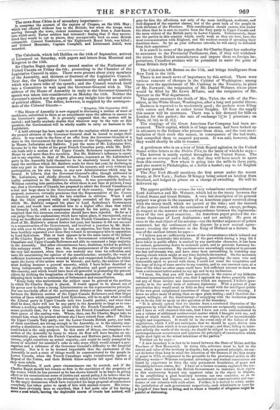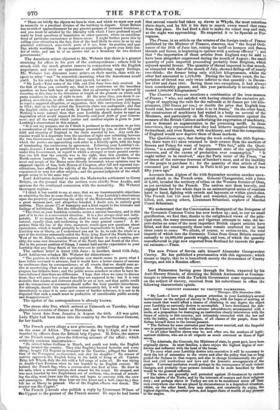The papers publish in extenso the very voluminous correspondence of
Lord Ashburtui and Mr. Webster, which led to the treaty between the
United States and Great Britain. A very fair description of its general purport was given in the summary of an American paper received along with the treaty itself, which we quoted at the time ; and the interest
of the matter closed with the conclusion of the treaty, except, perhaps, in respect to the manner of the correspondence between the representatives of the two great countries.. An American paper praised the extreme frankness of Lord Ashburton ; and not unduly. He goes at once to the real object of his mission—not the further argument of points contested, but the settlement of the dispute by a new mutual agreement ; treating the reference to the King of Holland as a failure. In one of the earliest letters he says " I believe you ar: sufficiently aware of the circumstances which induced mepersonally to undertake this mission. If the part which during a long life I have taken in public affairs is marked by any particular character, it has been an earnest, persevering desire to maintain peace, and to promote harmony between our two countries. My exertions were unavailingly employed to prevent the last unFirtunate war, and have since been unremitting in watching any passing clouds which might at any time forebode its renewal. On the accession to power of the present Ministers in England, perceiving the same wise and honourable spirit to prevail with them, I could not resist the temptation and the hope of being of some service to my country, and to our common race, at a time of life when no other cause could have had sufficient interest to draw use from a retirement better suited to my age and to my inclination.
"I trust, Sir, that you will have perceived, in the course of my hitherto informal communications with you, that I approach my duties generally without any of those devices and manceuvres which are supposed, I believe ignorantly, to be the useful tools of ordinary diplomacy. With a person of your penetration they would avail as little as they would with the intelligent public of the two great enlightened countries of whose interests we are treating. I know no other mode of acting than an open plain dealing ; and I therefore disregard, willingly, all the disadvantage of complying with the invitation given me to be the first to speak on this question of the boundary. " It is already agreed that we abstain from a continued discussion of the arguments by which the lines of the two countries are reciprocally maintained; and I have so well observed this rule, that I have not even communicated to you a volume of additional controversial matter which I brought with me, and much of which would, if controversy were our object, be of no inconsiderableweight and importance. It would be in the event only of the failure of this negotiation, which I will not anticipate, that we should be again driven into the labyrinth from which it is our purpose to escape; and that, failing to interpret strictly the words of the treaty, we should be obliged to search again into contemporaneous occurrences and opinions for principles of construction which might shed light on the actual intentions of the parties."
Further on he says
" A new boundary is in fact to be traced between the State of Maine and the Province of New Brunswick. In doing this, reference must be had to the extent and value of the territory in dispute; but, as a general principle, we cannot do better than keep in mind the intention of the framers of the first treaty of peace in 1783, as expressed in the preamble to the provisional article in the following words—' Whereas reciprocal advantages and mutual convenience are
found by experience to form the only permanent foundation of peace and friendship between states, &c.' I have on a former occasion explained the rea sons which have induced the British Government to maintain their rights in this controversy beyond any apparent value in the object in dispute, to be establishing a good boundary between our two countries, so as to
prevent collision and dispute, and an unobstructed communication and connexion of our colonies with each other. Further, it Is desired to retain under the jurisdiction of each government respectively, such inhabitants as have for a length of time been so living, and to whom a transfer of allegiance might be palatal or distressing.
" These are briefly the objects we have in view, and which we must now seek to reconcile to a practical division of the territory in dispute. Great Britain has no wish of aggrandizement for any general purpose of increased dominions ;
and you must be satisfied by the liberality with which I have professed myself ready to treat questions of boundaries in ether quarters, where no considera tions of particular convenience or fitness occur. I might further prove this by calling your attention to the fact, that of the land likely to come to us by any practical settlement, nine-tenth parts of it are, from its position and quality, wholly worthless. It can support no population, it grows even little timber of value, and can be of no service but as a boundary for two distinct governments." The American writer objected to Mr. Webster that there is a greater straining for effect in his part of the correspondence : others will be
struck with the much greater reserve in comparison with the English negotiator, and even an appearance of maintaining angry feelings.
Webster less discusses some points on their merits, than with respect to what " can " be conceded ; meaning, what the Americans would yield. In his reply to the letter just quoted, he says " My Lord—Your notes of the 13th and 21st June were duly received In the first of these you correctly say, that in our conference on the boundary question we have both been of opinion that no advantage would be gained by resorting at this time to the discussion at length of the grounds on which each party considers its claim of right to rest. At the same time, you deem it expedient, nevertheless, to offer some observations, calculated in your judgment, to repel a supposed allegation, or suggestion, that this controversy only began in 1814; that up to that period the American claim was undisputed ; and that the English claim, as now set forth, is founded merely in motives of interest. Nothing is more natural than that your Lordship should desire to repel an imputation which would impeach the sincerity and good faith of your Governmeat; and all the weight which justice and candour require is given to your Lordship's observations in this respect. "It is not my purpose, nor do I think it pertinent to the occasion, to go into a consideration of the facts and reasonings presented by you, to show the good faith and sincerity of England in the claim asserted by her. Any such discussion would be a departure from the question of right now subsisting between the two Governments, and would be more especially unfit for an occasion in which the parties are approaching each other in a friendly spirit, with the hope of terminating the controversy by agreement. Following your Lordship's example, however, I most be permitted to say, that few questions have ever arisen under this Government, in. regard to which a stronger or more general conviction was felt that the country was in the right, than this question of the North-eastern boundary. To say nothing of the sentiments of the Governtnent and people of the States more directly interested, whose opinions may be supposed capable of bias, both Houses of Congress, after full and repeated considerations, have affirmed the validity of the American claim, by an unanimity experienced on very few other subjects; and the general judgment of the whole people seems to be the same way."
Lord Ashburton desired to retain the Madawaska settlement to Great Britain, on the ground that the settlers were chiefly from Acadia, and anxious for the continued connexion with the monarchy. Mr. Webster thereupon replies
" I think it but candid to say at once, that we see insurmountable objections to admitting the line to come South of the river. Your Lordship's observations upon the propriety of preserving the unity of the Madawaska settlement are in a great measure just, and altogether founded, I doubt not, in entirely good motives. They savour (1) of humanity and a kind regard to the interests and feelings of individuals. But the difficulties seem insuperable. " The river, as your Lordship remarks, seems a natural boundary, and in this part of it to run in a convenient direction. It is a line always clear and indisputable. If we depart from it, where shall we find another boundary, equally natural, equally clear, and conforming to the same general course ? A departure from the line of the river, moreover, would open new questions about equivalents, which it would probably be found impracticable to settle. If your Lordship was at liberty, as I understand you not to be, to cede the whole or a part of the territory commonly called the Strip, lying East of the North line and West of the St. John's, considerations might be found in such a cession, possibly, for some new demarcation West of the North line and South of the river. But in the present position of things, I cannot hold out the expectation to your Lordship that any thing South of the river can be yielded.", The earliest letter is dated 13th June : in another, dated llth July, Lord Ashburton rebukes Mr. Webster for dilatoriness " The position in which this negotiation now stands seems to prove what I have before ventured to advance, that it would have a better chance of success by conference than by correspondence; at all events, that we should soon arrive at ascertaining what we can or cannot do. Slow, unnecessarily slow, our progress has hitherto been; and the public seems somehow or other to have become informed that there are differences. I hope that when we come to discuss them, they will prove less serious than they are supposed to be : but it is very desirable that doubts and distrusts should be set at rest, and that public credit and the transactions of commerce should suffer the least possible disturbance. For although, should this negotiation unfortunately fail, it will be our duty immediately to place it in some new course of further reference, it is not to be disguised that such a result must he productive of considerable public anxiety and disappointment."
The upshot of the correspondence is already known.



























 Previous page
Previous page